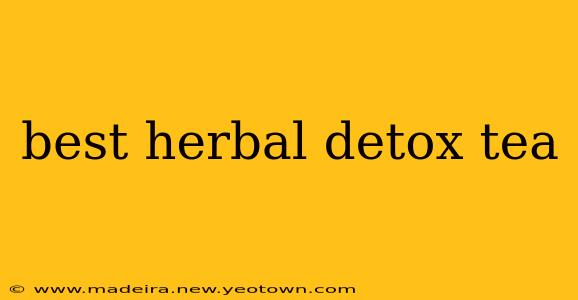For centuries, herbal teas have been celebrated for their potential health benefits, and the idea of a "detox tea" has captured the imagination of many seeking a natural path to wellness. But what truly constitutes the "best" herbal detox tea? It's not a one-size-fits-all answer, as the ideal blend depends on individual needs and preferences. This journey will explore the world of herbal detox teas, guiding you toward making informed choices for your unique well-being.
This isn't about a magical overnight cleanse; rather, it's about supporting your body's natural detoxification processes through the gentle power of plants. Think of it as a refreshing, flavorful way to nurture your inner landscape.
What Makes a Detox Tea Effective?
The effectiveness of a detox tea hinges on the synergistic properties of its ingredients. Many popular blends incorporate herbs known for their diuretic, antioxidant, and anti-inflammatory properties. These herbs work together to help your body flush out excess water, neutralize harmful free radicals, and reduce inflammation.
Common Herbs Found in Detox Teas and Their Potential Benefits:
- Dandelion Root: Often hailed for its diuretic properties, dandelion root may help support kidney function and promote fluid elimination.
- Milk Thistle: Known for its potential liver-supporting properties, milk thistle is often included to encourage healthy liver function, a crucial organ in detoxification.
- Burdock Root: Traditionally used to support the body's natural cleansing processes, burdock root has been associated with improved skin health.
- Ginger: Renowned for its anti-inflammatory and digestive benefits, ginger can soothe the gut and aid digestion, which plays a role in overall detoxification.
- Lemon Balm: This calming herb may contribute to stress reduction, a crucial factor in overall well-being, as stress can impact the body's detoxification systems.
Is There a Specific "Best" Herbal Detox Tea?
There isn't one single "best" detox tea. The ideal blend depends on your individual needs and preferences. Consider what you're hoping to achieve. Are you looking for increased hydration? Do you want to support your digestive system? Or are you primarily focused on antioxidant benefits? These considerations will guide you to the right blend for you.
What are the Side Effects of Detox Teas?
While generally safe for most people, detox teas can cause side effects in some individuals. These may include:
- Diarrhea: Due to the diuretic effect of certain herbs.
- Stomach upset: Some individuals may experience nausea or abdominal discomfort.
- Drug interactions: Detox teas can interact with certain medications. Always consult your doctor before using detox teas, especially if you're taking prescription drugs.
How Often Should I Drink Detox Tea?
The frequency of detox tea consumption varies depending on the blend and individual tolerance. Start with one cup per day and observe how your body reacts. You can gradually increase the frequency if you find it well-tolerated. It's essential to listen to your body and adjust accordingly.
Can Detox Tea Help with Weight Loss?
While detox teas may support overall well-being, they are not a magic bullet for weight loss. Sustainable weight management requires a holistic approach that includes a balanced diet, regular exercise, and a healthy lifestyle. Detox teas can be a part of a healthy lifestyle, but they should not replace other essential elements of a weight-management plan.
Are There Any Precautions I Should Take?
- Consult your doctor: Always discuss the use of detox teas with your physician, particularly if you have underlying health conditions or are taking medication.
- Choose reputable brands: Select detox teas from reputable brands that provide detailed ingredient information.
- Look for organic ingredients: Opt for teas made with organically grown herbs whenever possible.
- Don't overdo it: Excessive consumption of detox teas can lead to unwanted side effects. Moderation is key.
Disclaimer: This information is for educational purposes only and is not intended as medical advice. Always consult with a healthcare professional before starting any new health regimen, especially if you have pre-existing health conditions or are taking medication.

